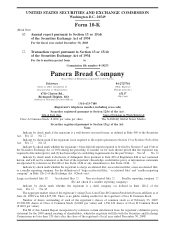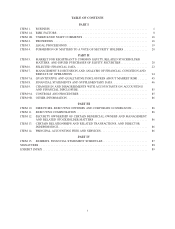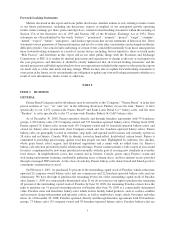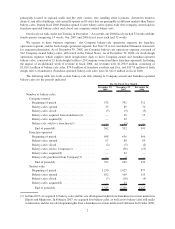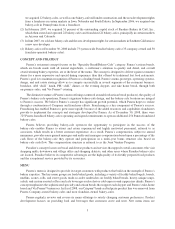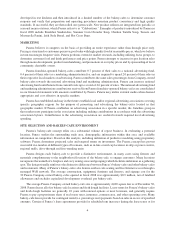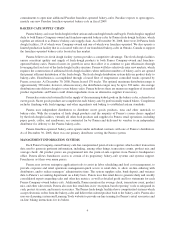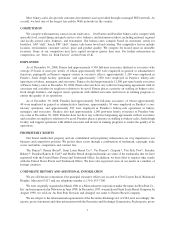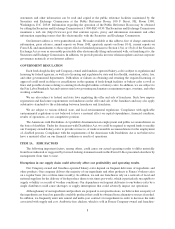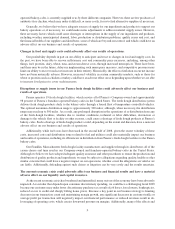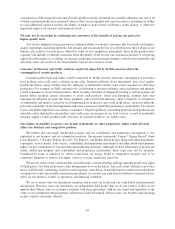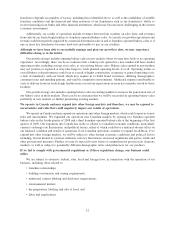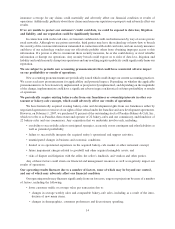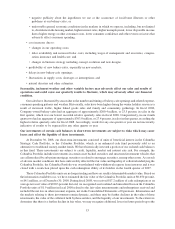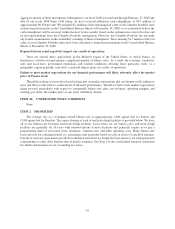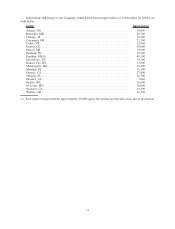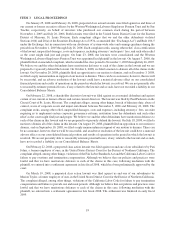Panera Bread 2008 Annual Report Download - page 16
Download and view the complete annual report
Please find page 16 of the 2008 Panera Bread annual report below. You can navigate through the pages in the report by either clicking on the pages listed below, or by using the keyword search tool below to find specific information within the annual report.operated bakery-cafes, is currently supplied to us by three different companies. However, there are few producers of
antibiotic-free chicken, which may make it difficult, or more costly, for us to find alternative suppliers if necessary.
Generally, we believe that we have adequate sources of supply for our ingredients and products to support our
bakery operations or, if necessary, we could make menu adjustments to address material supply issues. However,
there are many factors which could cause shortages or interruptions in the supply of our ingredients and products,
including weather, unanticipated demand, labor, production or distribution problems, quality issues and cost, and
the financial health of our suppliers and distributor, some of which are beyond our control, and which could have an
adverse effect on our business and results of operations.
Changes in food and supply costs could adversely affect our results of operations.
Our profitability depends in part on our ability to anticipate and react to changes in food and supply costs. In
the past, we have been able to recover inflationary cost and commodity price increases, including, among other
things, fuel, proteins, dairy, wheat, tuna, and cream cheese costs, through increased menu prices. There have been,
and there may be in the future, delays in implementing such menu price increases, and competitive pressures may
limit our ability to recover such cost increases in their entirety. Historically, the effects of inflation on our net income
have not been materially adverse. However, increased volatility in certain commodity markets, such as those for
wheat or proteins such as chicken or turkey could have an adverse effect on us depending upon whether we are able
to increase food prices to cover such increases.
Disruptions or supply issues in our Panera fresh dough facilities could adversely affect our business and
results of operations.
Panera operates 19 fresh dough facilities, which service all of Panera’s Company-owned and approximately
98 percent of Panera’s franchise-operated bakery-cafes in the United States. The fresh dough distribution system
delivers fresh dough products daily to the bakery-cafes through a leased fleet of temperature controlled vehicles.
The optimal maximum distribution range is approximately 300 miles; although, when necessary, the distribution
range may reach up to 500 miles. As a result, any prolonged disruption in the operations of or distribution from any
of the fresh dough facilities, whether due to weather conditions, technical or labor difficulties, destruction or
damage to the vehicle fleet or facility or other reasons, could cause a shortage of fresh dough products at Panera’s
bakery-cafes. Such a shortage of fresh dough products could, depending on the extent and duration, have a material
adverse effect on our business and results of operations.
Additionally, while fuel costs have decreased in the second half of 2008, given the recent volatility of these
costs, increased costs and distribution issues related to fuel and utilities could also materially impact our business
and results of operations, including its efficiencies in distribution from Panera’s fresh dough facilities to the Panera
bakery-cafes.
Our Franklin, Massachusetts fresh dough facility manufactures and supplies through its distributors all of the
cream cheese and tuna used in our Company-owned and franchise-operated bakery-cafes in the United States.
Although we believe we have adopted adequate quality assurance and other procedures to ensure the production and
distribution of quality products and ingredients, we may be subject to allegations regarding quality, health or other
similar concerns that could have a negative impact on our operations, whether or not the allegations are valid or we
are liable. Additionally, defending against such claims or litigation can be very costly and the results uncertain.
The current economic crisis could adversely affect our business and financial results and have a material
adverse effect on our liquidity and capital resources.
As the recent economic crisis has broadened and intensified, many sectors of the economy have been adversely
impacted. As a retailer that depends upon consumer discretionary spending, we could face a challenging fiscal 2009
because our customers may make fewer discretionary purchases as a result of job losses, foreclosures, bankruptcies,
reduced access to credit and sharply falling home prices. Because a key point in our business strategy is limiting
decreases in our transaction count and maintaining margin growth, any significant decreases in customer traffic or
average profit per transaction will negatively impact our financial performance as reduced revenues result in de-
leveraging of operating costs, which creates downward pressure on margins. Additionally, many of the effects and
9


